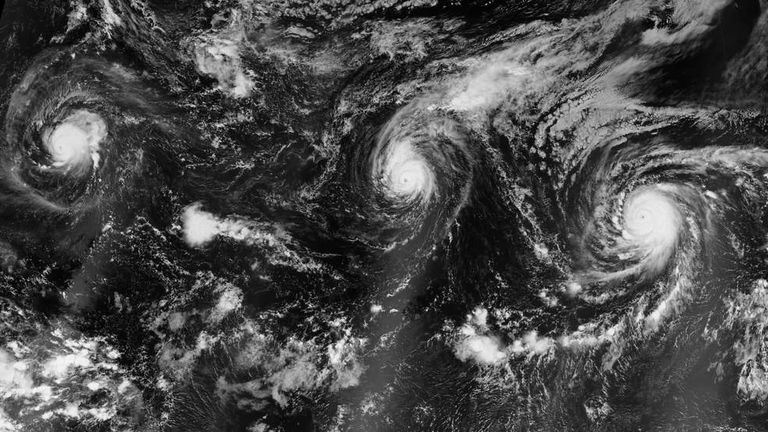What Is An El Nino And How Will It Affect Us?
Although warming in the Pacific Ocean may seem irrelevant to the UK, it can have an effect on weather systems around the world.
Monday 14 September 2015 11:33, UK
Having begun work with the Met Office in 1991, the strong El Nino of 1997/98 stands out in my memory.
The weather impact around the world made headlines in the papers and, for me, as a TV forecaster.
For the first time in my career, it was the internet which really enhanced my research on the subject – with the spread of footage and articles helping to paint a picture of what was happening across the globe.
We are again experiencing a strong El Nino event, one of the strongest since 1950, and it is set to continue through the Northern Hemisphere winter.
What is an El Nino? It is the warming of the surface waters in the central Pacific Ocean.
It is a natural phenomenon, occurring roughly every two to seven years.
It might not seem that relevant to us in the UK, but the warming of a huge body of water in the Pacific Ocean by several degrees can have an impact on weather systems around the globe.
Typically in an El Nino year, we would expect the Indian monsoon to be weaker with less rain, with Indonesia, the Philippines and Australasia drier than normal, leading to the increased risk of drought.
Meanwhile, in southern states of America, along with Peru and Ecuador, weather systems fuelled by the increased warmth and moisture could see enhanced winter rainfall leading to the risk of flooding.
Typhoon activity in the Western Pacific will also increase for Korea and Japan but Atlantic hurricane development will be suppressed.
How about closer to home?
It is thought that El Nino tends to bring us colder and drier winters. That was the case during the severe winter of 2009/10.
However, it was not the case during that of 1997/98, although the tail end of the winter did linger well into spring. I would say it is very difficult to attribute El Nino to any significant change in weather patterns here.
and I believe this may also contribute to us experiencing a cooler, drier winter.
This is not to say that the jet stream won't bring us some winter storms, it no doubt will, although the season may end up being drier and cooler when compared to average.




